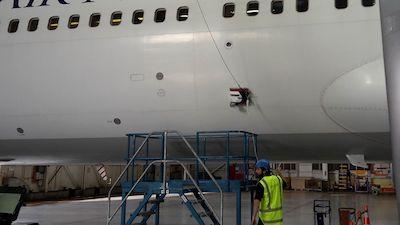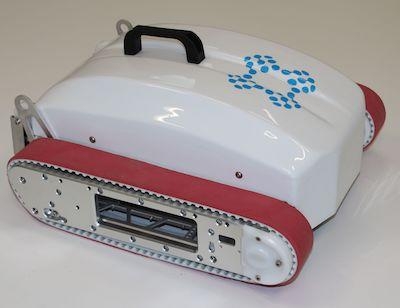Fri, Feb 23, 2018
Robots Can Adhere To Aircraft Surfaces for Inspections
A New Zealand company has created robots designed to ultimately improve the safety of the world’s multi-billion dollar aviation market.

Considered a ‘disruptor’ in the industry, Invert Robotics’ technology is enabling significant change in the aircraft Maintenance Repair and Overhaul (MRO) sector with its remote-controlled robots that use a patented suction mechanism to adhere to and traverse a range of surfaces including aluminium, glass and carbon fibre; even when aircraft surfaces are wet or require an upside down inspection.
Zurich-based aircraft maintenance group SR Technics is the first European company to use Invert Robotics technology in a program certain to change the nature of many aircraft maintenance and inspection processes.
Equipped with a high definition camera and sensor technology, the robot records and transmits video images to a ground-based screen for real-time analysis by line-maintenance staff, enabling efficient visual inspections (GVI and DVI) on the tarmac or in the hangar. Images can be used for more detailed repair assessments and as a record of ‘current state’ for future comparison purposes.
Rapid set-up and efficient inspection can reduce checks for operational damage from hours to minutes, while eliminating the risks of staff working at height. Its technology will soon include ultra-sound and thermographic testing, allowing many labour-intensive and tedious maintenance inspection processes to be performed. This frees up skilled aircraft engineers to attend to more complex tasks and reduces the time and cost of aircraft maintenance.

“SR Technics is constantly looking for ways to improve the services and reduce the costs to our customers in this highly competitive industry,” said SR Technics CEO Jeremy Remacha. “Time savings mean our customers have their aircraft back in service sooner and for airlines that is a huge benefit. Being able to record the state of an aircraft proves the need for and quality of our work, and allows more accurate scheduling of required maintenance. We are excited to be part of this innovation that we believe will have a significant effect in our industry.”
“Having developed the world’s first inspection robot of its kind, Invert Robotics has evolved to deliver tools and technologies for difficult-to-access areas, quickly and safely,” said Neil Fletcher, Managing Director of Invert Robotics. “The opportunity to evolve from inside concave surface to outside convex surfaces brought the aviation industry into clear focus as a significant market for Invert Robotics.”
(Image provided with Invert Robotics news release)
More News
Aero Linx: Transport Canada We are a federal institution, leading the Transport Canada portfolio and working with our partners. Transport Canada is responsible for transportation p>[...]
Gross Navigation Error (GNE) A lateral deviation from a cleared track, normally in excess of 25 Nautical Miles (NM). More stringent standards (for example, 10NM in some parts of th>[...]
From AirVenture 2017 (YouTube Edition): Flight-Proven Booster On Display At AirVenture… EAA AirVenture Oshkosh is known primarily as a celebration of experimental and amateu>[...]
Aircraft Parachute System (CAPS) Was Deployed About 293 Ft Above Ground Level, Which Was Too Low To Allow For Full Deployment Of The Parachute System Analysis: The day before the a>[...]
Also: 48th Annual Air Race Classic, Hot Air Balloon Fire, FAA v Banning 100LL, Complete Remote Pilot The news Piper PA-18 Super Cub owners have been waiting for has finally arrived>[...]
 ANN's Daily Aero-Linx (06.29.25)
ANN's Daily Aero-Linx (06.29.25) ANN's Daily Aero-Term (06.29.25): Gross Navigation Error (GNE)
ANN's Daily Aero-Term (06.29.25): Gross Navigation Error (GNE) Classic Aero-TV: Anticipating Futurespace - Blue Origin Visits Airventure 2017
Classic Aero-TV: Anticipating Futurespace - Blue Origin Visits Airventure 2017 NTSB Final Report: Cirrus SR22
NTSB Final Report: Cirrus SR22 Airborne Affordable Flyers 06.26.25: PA18 Upgrades, Delta Force, Rhinebeck
Airborne Affordable Flyers 06.26.25: PA18 Upgrades, Delta Force, Rhinebeck




